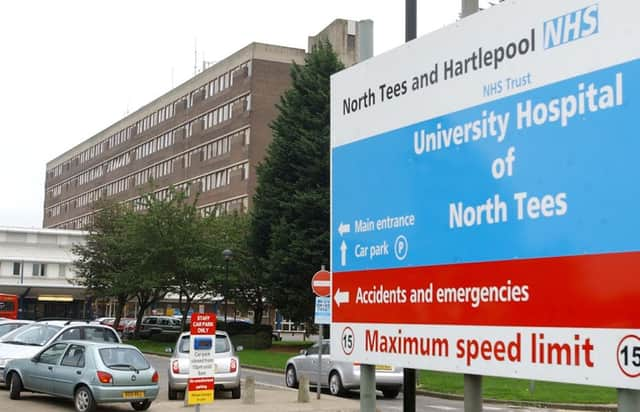Hartlepool hospital chiefs urged not to discharge elderly patients late at night


Staff from North Tees and Hartlepool NHS Foundation Trust admitted such cases were not acceptable and told how the trust was working to get patients home earlier in the day and improve support for elderly people in their own homes.
Two members of the trust involved in the discharge process attended a meeting of Hartlepool Borough Council’s Adult Services Committee to respond to concerns around transport and medication.
Advertisement
Hide AdAdvertisement
Hide AdCouncillor Sandra Belcher said she knew of a 91-year-old care home resident brought back from hospital in a taxi on their own and of a woman discharged at 3am by taxi.
Coun Rob Cook said: “We have also heard of cases in the past where people are left standing outside North Tees at three o’clock in the morning, no money in their pocket, confused.
“They shouldn’t be discharged at that time in the morning, irresepctive of how old they are but especially when they’re aged.
“I just think it’s totally wrong peolpe are discharged after a certain cut off time.”
Advertisement
Hide AdAdvertisement
Hide AdCoun Cook pressed for assurances from the trust that patients would not be allowed to wait for transport outside hospital on their own.
Julie Parkes, associate director of out of hospital care, said: “I agree that’s not acceptable. Clearly if people have specific information and names to track cases back we would look into that.
“Obviously if people have got the right transport and families are happy to take them that’s a choice issue, then that’s completely different.”
Jill Foreman, senior clinical professional, said patients who turn up at A&E after 7pm are kept in overnight even if they do not need hospital care if the trust is not been able to make sure appropriate arrangemnets are in place for them at home.
Advertisement
Hide AdAdvertisement
Hide AdShe said: “There is people who unfortunately fall outside that and I think we acknowledge that’s unacceptable at three o’clock in the morning but we’re trying to put services in front of house so people can get home as safely as possible.”
Ms Forman said taxis were one transport option the trust used as well as the North East Ambulance Service and its own patient transport service which was taking on more staff.
Ms Parkes said less than one per cent of patients are disharged between midnight and 8am with the majority (62.37%) released between 8am-5pm.
Committee chairman Coun Carl Richardson said: “It’s not the first time these things have happened.” He asked the trust to act on the issues raised where possible.
Work underway to improve ‘patient flow’
Advertisement
Hide AdAdvertisement
Hide AdHospital officials explained a range of measures being taken by the trust to speed up the discharge process.
Jill Foreman, senior clinical professional, said early planning was key to making sure the right transport and medications were in place when patients are declared ready to go home.
She said: “We are doing a lot of work at the moment about identifying when patients are ready for discharge and doing that as early as we possibly can so we can make sure that prescription, that consultant’s letter are ready.
“We’re not there yet and have got a lot of work to do.”
Ms Foreman said the measures should avoid a “bottleneck” of patients waiting to be discharged around teatime.
Advertisement
Hide AdAdvertisement
Hide AdJulie Parkes, associate director for out of hospital care, also said the trust was looking at making changes to its Patient Flow Team and including therapy teams on hospital wards.
It is in response to the trust seeing an increasing number of frail and elderly patients with multiple long term conditions.
Ms Parkes added Better Care Fund money should improve information sharing between everyone involved and said the trust is working to provide greater support outside of hospital from community matrons and rapid response nurses to help treat people at home.
“We believe a high proportion of patients could have been treated effectively at home,” she said.
She added the trust was also looking at additional resources to support seven day working in hospital.